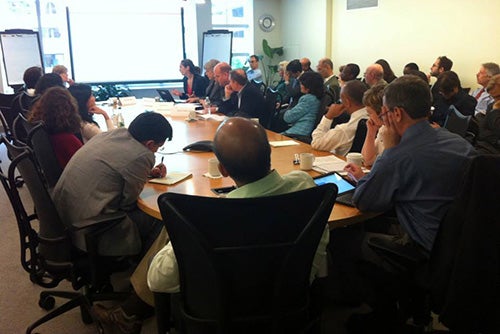On May 20, the JKP organized "Jobs and Shared Prosperity Day," which brought together development practitioners and researchers from numerous sectors and disciplines to exchange insights. We had sessions on a variety of issues related to jobs, such as youth, rights, skills, gender, enterprise dynamics, and the recent global financial crisis. We also took the opportunity to deliver the prizes for the Experiences from the Field, a contest that showcases projects aimed at creating jobs and improving employment possibilities.

Fostering self-employment and small scale entrepreneurs
A topic common to several of the sessions, including the one on youth employment, was the role of self-employment and small scale entrepreneurship as a source of jobs. It's an important question given that about 67 percent of those working around the world are farmers or self-employed, often in small family businesses. These workers are usually involved in activities with very low productivity and close to 70 percent of these workers are poor (see paper by T.H. Gindling and David Newhouse). Among youth, the prevalence of self-employment is even higher — in Africa, 80 percent of working youth are self-employed or farmers (see paper by Cho et al.).
For a long time, many governments have been trying to find ways to support these small scale entrepreneurs or to help the unemployed become such entrepreneurs. The interventions usually combine training (technical, life skills, and basic business management), access to finance, advisory services, and assistance to access markets or value-chains.
Yet, what we know from the few evaluations that have been done on these types of interventions is that the programs often aren't very successful in increasing activity rates, employment rates, or earnings. When success does occur, according to a recent review by Yoonyoung Cho and Maddalena Honorati, the programs combine training and access to finance, rather than offering either training or finance alone. But even then, these successes are rare. A close look at their data shows that only in 25 percent of the cases there is a significant difference in activity and/or earnings indicators between those who participate in the programs and those who do not.
This finding shouldn't come as a surprise. It's tough to find true entrepreneurs — individuals that have not only the technical skills but also the personality, behaviors, and attitudes of an entrepreneur (creativity, perseverance, communication skills, and risk taking). The reality is that most of the self-employed or small scale entrepreneurs are really subsistence entrepreneurs who run some type of business not by vocation and choice, but because there are no other options to make a living.
Rethinking interventions for the subsistence entrepreneurs
So what does this reality mean for policy makers? Some researchers and practitioners have been arguing that programs to support self-employment and entrepreneurship — including among youth — should focus on those individuals who really are or can become entrepreneurs and create/manage businesses with some growth potential (see Antoinette Schoar's paper on the divide between subsistence and transformation entrepreneurship). And there are some initiatives to develop surveys that can be used to identify the true entrepreneurs — although picking "winners" is never easy.
But then, what do we do with the rest, the large majority? At the Jobs and Shared Prosperity Day opening panel, there were dissenting views. Ravi Kanbur (Cornell University) thought it was difficult to pick the gazelles and helping the others meant eventually getting them into wage employment. Jaime Saavedra (World Bank) had a more optimistic view about initiatives that try to increase the productivity and earnings of the subsistence entrepreneurs.
My own view is that in the near future, in regions like Africa and South Asia, there won't be sufficient wage employment to absorb all the new entrants to the labor market. For many youth, self-employment will be the way to make a living, particularly in rural areas, and there can be a role for interventions that help them make this transition. But the types of interventions will need to be different. It won't be about running business competitions and offering training, grants, or access to credit. A more hands-on approach will be required where NGOs or social entrepreneurs do the following:
- Work with groups of youth.
- Help them identify a joint business in farm or non-farm activities that can be connected to markets of decent size or value chains.
- Provide the training for and access to the necessary production technologies.
- Support them during the start-up and initial operations.
The expectation is that eventually a few of the "partners" will be able to take over management and the social entrepreneurs can move on to the next venture.
This post was first published on the Jobs Knowledge Platform.


Join the Conversation